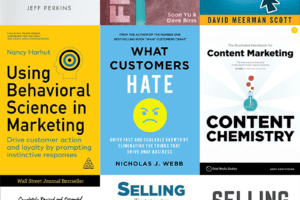???? Episode 100 of Yes, and Marketing
Denise and Jim Franklin are the Beyoncé and Jay-Z of Colorado’s tech startup scene. They’ve also been friends and mentors to Verblio since our company’s earliest days, so we were excited to have them join us for the 100th episode of Yes, and Marketing.
The Franklins bring a wealth of wisdom from companies like SendGrid and Oracle, in addition to the numerous startups they’ve advised over the years. In this interview, they share what they look for when investing, how to structure a startup team, what *not* to prioritize, and what makes their marriage work. (Didn’t know a ‘marriage operating system’ was a thing? You do now.)
Listen to the full interview above or read on for our highlights from the conversation. You can also view excerpts from all our episodes on our show page.
???? Guest-at-a-Glance
Name: Denise and Jim Franklin
What they do: Angel investors and startup advisors.
Find Denise on the web: Twitter | LinkedIn
Find Jim on the web: Twitter | LinkedIn
Get smart: “Choosing the path of most learning is always the right answer in hindsight.”
???? Episode Highlights
Read verbatim excerpts from our interview with Denise and Jim Franklin
Revenue solves all problems????
“Revenue kind of solves all problems, right? You can raise money, hire people and do things. And if you have a beautiful business that has great technology and good accounting and excellent marketers, but no revenue, that’s big trouble.”
What startups *shouldn’t* prioritize
“KPIs work if you’re Google, you’re giant, and you need everyone in this thousands-of-people company to be aligned. But when you’re a startup and your hair’s on fire and you’re trying to get product market fit and you’re trying to hire people— Focus on a few key metrics that make sense for you, but developing this system of KPIs is insane.”
The three roles a startup needs
- Mousetrap person: “Classic founders, they know about the product or the thing.”
- Go-to-market person: “They’ve got to think about sales and marketing and pricing and channels and competition and all of that stuff.”
- Fin ops person: “That is the person who wants to be innovative and creative about how you raise money or how you structure your working capital, etc.”
Don’t assume you can’t afford someone
“Maybe you need a paycheck, but not all senior people do. Whether they’ve had an exit and want to sort of recycle it back into the business, or they might have a spouse who is an anesthesiologist and pays the bills.
…Some people hold themselves back because they won’t even ask to hire at the right level. They’ll just sort of say, ‘Oh, I can’t afford that person.’ Well, you don’t know what their situation is, you know, go find them.”
Advice for a startup CEO ????
“Don’t parachute in. As a CEO, your job is to create a team to go do stuff. And so if something’s not getting done, then there’s a failure on your direct reports somewhere, right? You’ve not hired well or trained them or coached them. So, if you happen to have domain expertise in that area, the worst thing you can do is parachute in, fix it, and then relieve the pain in the organization, so you don’t solve the real problem, which is the team.”
Their secret to a successful marriage
“A ‘marriage operating system’ is running your marriage or life as a business. Jim and I are both business people, and so we meet quarterly, we have an agenda, we review our calendars, our finances, our goals—and honestly, I can’t imagine being in a relationship where we didn’t do this.”
What’s ahead when the market turns
“In the world we live in now, hiring is hard, but sales are easy. Customers have money and fundraising is easy. Lots of VCs raising new funds, doing followons.
But in a down market, everything switches, right? You can’t raise a nickel and customers are super tough—but hiring is easy.
…And so just your cost of inputs falls, so it’s a different challenge to your business skills.”
When advice should be contrarian ????️
“You have to ask yourself, when shouldn’t I listen to customers? You’ve heard of the brighter candle problem: If you’re the business of creating light bulbs, you don’t want to hear customers telling you they want brighter candles.
And so I think your challenge as a leader or a founder is, when are we the exception versus the rule?”
????️ Denise Franklin Quotes
“Early product market fit makes all the difference in the world.”
“Hiring the wrong people can send you off in a very bad direction.”
“With an early stage startup, you have to do process just in time.”
“Using your own customer’s feedback to generate your own marketing messages is very powerful.”
????️ Jim Franklin Quotes
“If I see a startup that’s really good at KPIs, I take that as a strong negative. Because it’s poor performing companies that aren’t busy… they don’t have stuff breaking all the time.”
“There’s good problems and bad problems. Having a lot of things breaking is generally a good problem because it means it’s getting used.”
“If you buy right, anyone can make money. But if you buy high, you need to be kinda lucky to make money.”
“Choosing the path of most learning is always the right answer in hindsight.”
???? Learn More
Denise mentioned Liz Giorgi as one startup leader who inspires her. (Hear our conversation with Liz here.)



